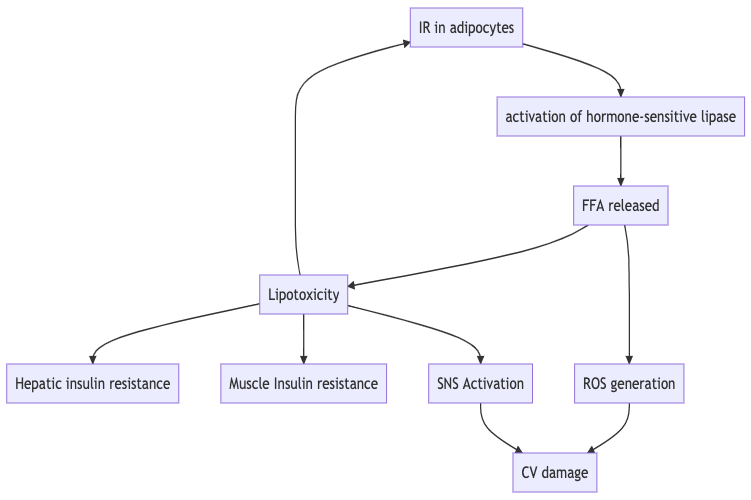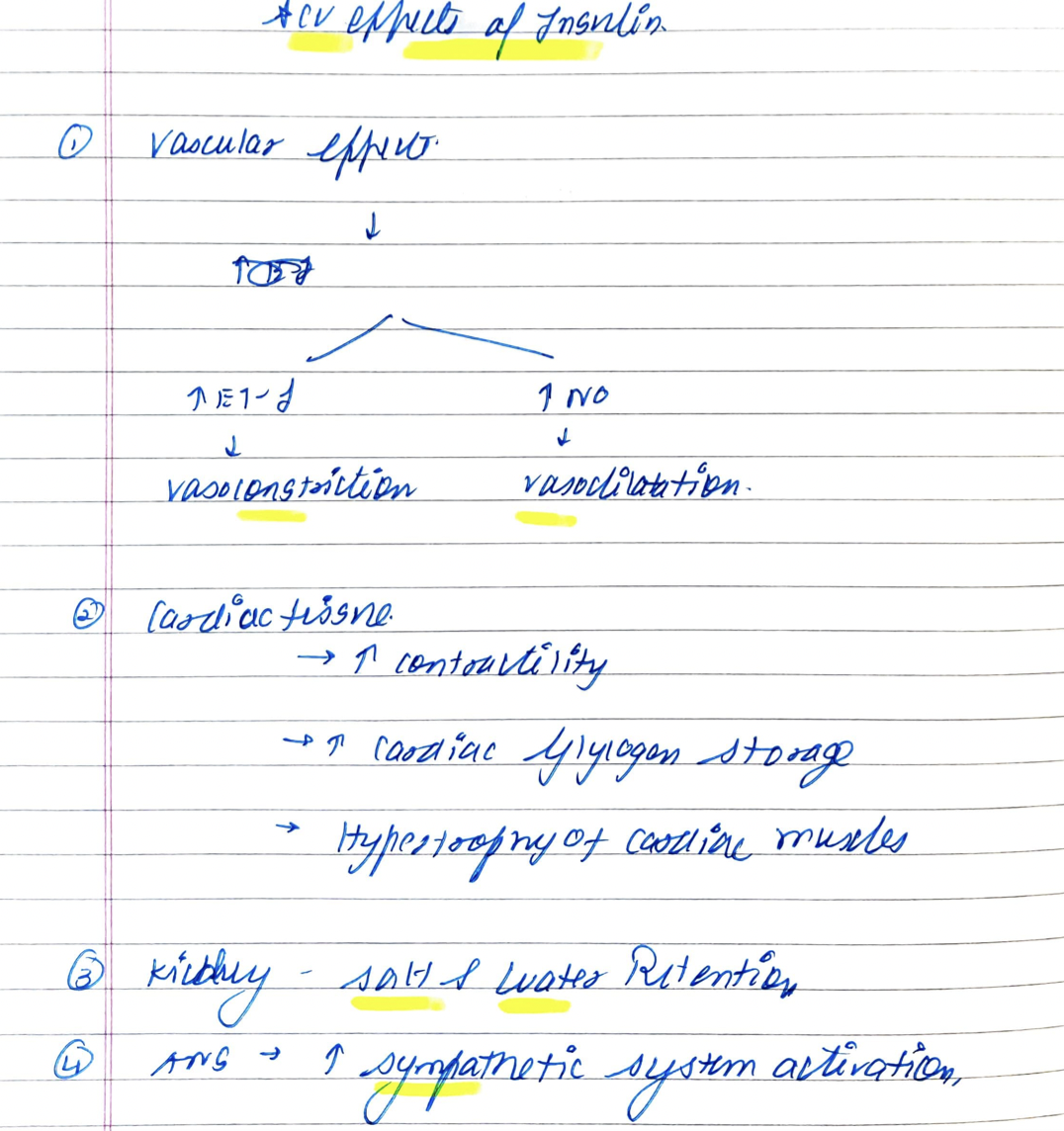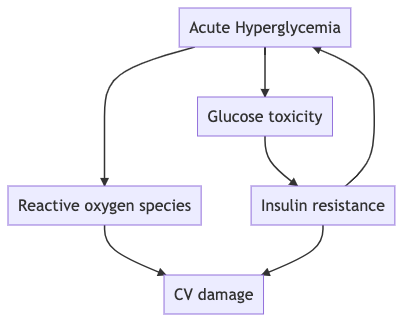-
Credits
- Section Writer: Dr. Om J Lakhani
- Section Editor: Dr. Om J Lakhani
-
Q. What is the effect of Insulin on the endothelium?
- It has Dual action
- It increases the release of Nitrous oxide (NO) from the endothelium
- It is release Endothelin-1 a vasoconstrictor from the endothelium
- It has Dual action
-
Q. What is the effect of Insulin on Vascular smooth muscles?
- Produces NO in vascular smooth muscles leading to dilatation
-
Q. What are the effects of insulin on the heart?
- Increases Glucose uptake by the heart
- Increases Cardiac glycogen storage
- Helps in cardiac contractility
- Helps in cardiac tissue growth
- Improves vascular perfusion by dilatation of coronaries
-
Q. What is the impact of Insulin on kidney and circulating volume?
- It increases sodium and water reabsorption from the kidney and increases circulating volume
-
Q. What is the impact of insulin on the Sympathetic nervous system (SNS)?
- Activates the SNS and leads to increase vasoconstriction
-
Q. What is the net effect of insulin on blood pressure?
- There are both vasodilatory and vasoconstrictive effects of insulin
- The overall net effect is no change in blood pressure because of the insulin
-
Q. Summarize the CV effects of Insulin?
-
**Insulin resistance and cardiovascular effects **
-
Q. What is the overall take on the link between Insulin resistance and cardiovascular disease ?
- The link between Insulin resistance and Cardiovascular disease is an area of debate.
- While the theoretical concept and some indirect clinical data (especially the IRIS trial) show a link between the two, many direct study show only circumstantial and weak link
-
Q. Why is there increase CV risk in patients with insulin resistance?
- Because insulin resistance is associated with Endothelial dysfunction
-
Q. Why does endothelial dysfunction occur in Insulin resistance (IR)?
- This is a very important concept
- With Insulin resistance there is selective resistance to the PI3K pathway
- However, flux through the MAPK pathway is preserved
- Hence there is less NO production but ET1 production is preserved
- This is the basis of cardiovascular dysfunction that occurs in diabetics
-
Q. What is the role of FFA in cardiovascular damage due to IR?
-

- IR= Insulin resistance; FFA = Free Fatty acid; SNS = Sympathetic nervous system; ROS=Reactive oxygen species; CV = Cardiovascular -
Q. What is the impact of Glucose Toxicity (Glucotoxicity) on CV dysfunction?
-
Q. What is the role of adipocytes?
-
Q. What is the net effect of IR on blood pressure?
- Because of
- Increase ET1
- Increase salt and water retention
- Absence of NO
- There is a net increase in blood pressure in IR
- Because of
-
Q. Summarize the effect of IR on the CV system?
- Endothelial dysfunction → reduces NO and increase ET1 → net increase of BP
- Lipotoxicity
- Glucotoxicity
- Production of inflammatory adipokines
- Increase renal sodium resorption
- Activation of the sympathetic nervous system
-
**Therapeutic interventions **
-
- Insulin resistance and metabolic syndrome is very well known to have increased CV risk
-
Q. Do lifestyle interventions improve the CV risk produced by IR?
- Yes
- Lifestyle measures increase adiponectin and improve CV dysfunction produced by IR
-
Q. What is the effect of Thiazolidinones on CV function in IR?
- TZD improve adiponectin levels and improve endothelial dysfunction
- They should produce the cardioprotective effect
-
Q. IS there any study which has shown this cardiovascular benefit of Pioglitazone?
- Yes – The PROactive study [1]
- The results of the study show that pioglitazone had only a modest, and not statistically significant, 10% reduction in the risk of the primary composite endpoint, which consisted of all-cause mortality, nonfatal myocardial infarction, stroke, acute coronary syndrome, and revascularization or amputation.
- However, the “main secondary endpoint,” consisting only of certain of the primary outcome measures, namely all-cause mortality, myocardial infarction, and stroke, was significantly reduced by 16%.
- Another study showing the particular outcome in question is the IRIS trial
- "In this trial involving patients without diabetes who had insulin resistance along with a recent history of ischemic stroke or TIA, the risk of stroke or myocardial infarction was lower among patients who received pioglitazone than among those who received placebo" [2]
- Yes – The PROactive study [1]
-
Q. What is the effect of Metformin in this pathway ?
- Metformin activates the AMPK pathway leading to increase flux through the PI3k pathway leading to increase NO production
- Hence it will have a benefit on the CV system
-
Q. What is the effect of ACEI/ ARB in this scenario?
- Improves BP
- Improves endothelial dysfunction
- Increase adiponectin
- Reduces CV risk
- Improve glycemia
-
Q. What about statins?
- They reduce inflammatory cytokines and improve Endothelial function
- But no effect on insulin resistance
-
Q. What is the effect of beta-blockers in this?
- Beta-blocker worsen insulin sensitivity
- However alpha1 blocker improve Insulin sensitivity
- Hence carvedilol which has alpha1 properties is a good beta-blocker for diabetics
-
Q. Summarize the effects of various therapeutic interventions on Insulin Resistance and the Cardiovascular system?
- Lifestyle measures – improve endothelial function
- TZD – improve –PROactive trial and IRIS trial
- Metformin – improve
- ACEI/ ARB- improve
- Statin- no effect on IR but improve endothelial function
- Beta-blocker- worsen, carvedilol may improve
Please consider donating to "Notes in Endocrinology" to keep us going. Please visit our DONATION page to know more
Dormandy JA, Charbonnel B, Eckland DJ, Erdmann E, Massi-Benedetti M, Moules IK, Skene AM, Tan MH, Lefèbvre PJ, Murray GD, Standl E. Secondary prevention of macrovascular events in patients with type 2 diabetes in the PROactive Study (PROspective pioglitAzone Clinical Trial In macroVascular Events): a randomised controlled trial. The Lancet. 2005 Oct 8;366(9493):1279-89 ↩︎
Ref: Kernan WN, Viscoli CM, Furie KL, Young LH, Inzucchi SE, Gorman M, Guarino PD, Lovejoy AM, Peduzzi PN, Conwit R, Brass LM. Pioglitazone after ischemic stroke or transient ischemic attack. N engl J med. 2016 Apr 7;374:1321-31. ↩︎


